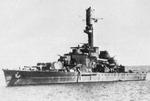Väinämöinen
| Country | Finland |
| Ship Class | Väinämöinen-class Coastal Defense Ship |
| Builder | Crichton-Vulcan Shipyard, Turku, Finland |
| Laid Down | 1 Aug 1929 |
| Launched | 29 Apr 1932 |
| Commissioned | 28 Dec 1932 |
| Displacement | 3,900 tons standard |
| Length | 305 feet |
| Beam | 55 feet |
| Draft | 16 feet |
| Machinery | Diesel-Electric powertrain, four Krupp engines, two shafts |
| Power Output | 4,800 shaft horsepower |
| Speed | 14 knots |
| Range | 700nm |
| Crew | 410 |
| Armament | 2x2x254mm Bofors guns, 4x2x105mm Bofors DP guns, 4x40mm Vickers, 2x1x20mm Madsen AA guns |
| Transferred to Russia | 29 May 1947 |
Contributor: C. Peter Chen
ww2dbaseVäinämöinen was the lead ship of her class of Finnish coastal defense ships. Along with sister ship Ilmarinen, these two ships were the most concentrated naval artillery ships ever built. They were designed by the Dutch firm NV Ingenieurskantoor voor Scheepsbouw and were built in Finland. Designed for home waters, she was shallow and unsuited for the open sea. This was demonstrated when Ilmarinen and Väinämöinen sailed to attend the fleet parade in honor of the coronation of United Kingdom's King George VI in 1937, where Väinämöinen needed tug help from the bigger Swedish ship HMS Drottning Victoria. Upon arrival at Spithead in the UK, they were praised for their beautiful lines and their heavy armament.
ww2dbaseDuring the Winter War of 1939-1940, Ilmarinen and Väinämöinen were initially deployed to the Åland Islands to prevent landings by Russian troops, then were transferred to Turku harbor in Southern Finland as a floating anti-aircraft gun platform. During the Continuation War, she bombarded the Russian base on the Hanko Peninsula on five occasions between Jul and Nov 1941. On 13 Sep 1941, she participated in Operation Nordwind, during which operation her sister ship Ilmarinen was lost to naval mines. Starting in 1943, she was deployed to the area between Helsinki and Kotka on the Finnish coast for patrols. During the Russian offensive against Germany in mid-1944, the Russians placed stress on the destruction of Väinämöinen, but she evaded most attacks and survived the war.
ww2dbaseOn 29 May 1947, Väinämöinen was turned over to Russia as war reparation. She was renamed Vyborg and served 6 years with the Baltic Fleet, based in Porkkala, Finland. She was modernized in the early 1950s and served as a residential ship in Tallinn, Estonia. She was scrapped in Leningrad, Russia in 1966.
ww2dbaseSource: Wikipedia.
Last Major Revision: Sep 2009
Photographs
 |  |
Väinämöinen Operational Timeline
| 28 Dec 1932 | Väinämöinen was commissioned into service. |
Did you enjoy this article or find this article helpful? If so, please consider supporting us on Patreon. Even $1 per month will go a long way! Thank you. Share this article with your friends: Stay updated with WW2DB: |
- » WW2DB's 20th Anniversary (29 Dec 2024)
- » Wreck of USS Edsall Found (14 Nov 2024)
- » Autumn 2024 Fundraiser (7 Nov 2024)
- » Nobel Peace Prize for the Atomic Bomb Survivors Organization (11 Oct 2024)
- » See all news
 |
- » 1,150 biographies
- » 337 events
- » 44,024 timeline entries
- » 1,241 ships
- » 350 aircraft models
- » 207 vehicle models
- » 375 weapon models
- » 123 historical documents
- » 260 facilities
- » 470 book reviews
- » 28,582 photos
- » 432 maps
Captain Henry P. Jim Crowe, Guadalcanal, 13 Jan 1943
Please consider supporting us on Patreon. Even $1 a month will go a long way. Thank you!
Or, please support us by purchasing some WW2DB merchandise at TeeSpring, Thank you!